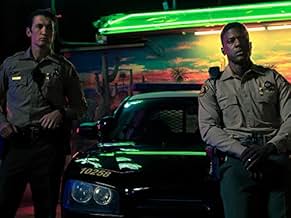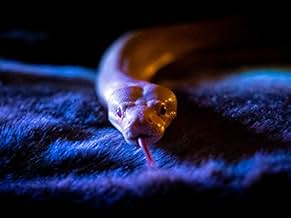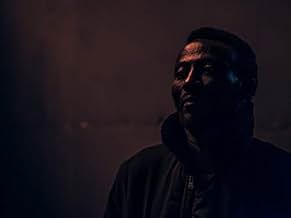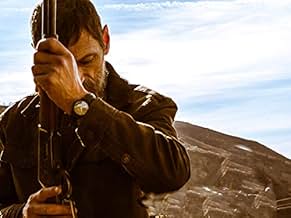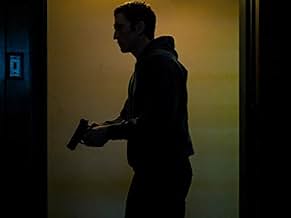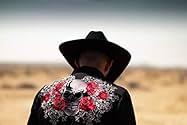Muito Velho para Morrer Jovem
Título original: Too Old to Die Young
O detetive Martin Jones, que leva uma vida dupla como assassino de aluguel em Los Angeles, sofre uma crise existencial que o leva mais fundo a um mundo de violência salpicado pelo sangue.O detetive Martin Jones, que leva uma vida dupla como assassino de aluguel em Los Angeles, sofre uma crise existencial que o leva mais fundo a um mundo de violência salpicado pelo sangue.O detetive Martin Jones, que leva uma vida dupla como assassino de aluguel em Los Angeles, sofre uma crise existencial que o leva mais fundo a um mundo de violência salpicado pelo sangue.
Explorar episódios
Resumo
Reviewers say 'Too Old to Die Young' presents Nicolas Winding Refn's distinct style with slow pacing, neon visuals, and a dark atmosphere. The series blends crime drama with surreal elements, using minimalist dialogue and long takes. Its unconventional storytelling and aesthetic beauty are praised, though the slow pace and non-linear plot divide opinions. The show delves into violence, existentialism, and the human condition with dark humor and satire, making it a unique yet polarizing experience.
Avaliações em destaque
I love Nicolas Winding Refn. Drive is one of my all time favorite movies, and I loved the Neon Demon and Bronson. So I was going into this show optimistic and excited, but towards the end of the first episode it felt like a 10 hour movie. There's a lot of amazing shots but the pacing is very Very slow, and it bored me out a lot. The show can be really great if the pacing was a bit better. I love the directing, music, style and the acting in the episode. Story isn't really that interesting. but like I said, the biggest flaw is the pacing. I couldn't continue watching anymore.
Nicolas Winding Refn said he wanted to create a "really long movie," and "Too Old to Die Young" was birthed from that desire. It is a very long, slow, bizarre, and violent series that covers a series of topics pertaining to corrupt police officers, the Mexican cartel, paid hitmen, psychics, and many more that are too graphic to write about. And I loved every minute of this show.
I am definitely biased because I enjoy Nicolas Winding Refn's films, but I found "Too Old to Die Young" to be mesmerizing and utterly engaging with its euphoric score and ethereal visuals. Granted, it took me about three episodes to be fully engaged, but the wait was certainly worth it. This show treats you to depraved characters you won't be able to help but like as the series goes on; to violent sequences that are filmed so beautifully that you'll want to look away but be unable to; to a slow-paced and nuanced story that consistently picks up steam and builds to an explosive finale; to plot points so horrific that you won't believe Amazon greenlit this series for their streaming platform. And it all makes for some of the best viewing I've had in a while.
As always, this show looks and sounds absolutely incredible, which isn't a surprise with Refn. This show has a decidedly over-stylized feel to it, with neon-drenched visuals and an overbearing score hanging overhead most scenes, and I couldn't get enough of it. Refn has a way of making those things work, and I just enjoy both of those aspects a lot in movies. Every episode submerges you to new things to look at and hear, and it is honestly exciting to see what Refn will make you endure next.
As I mentioned, "Too Old to Die Young" also has a story that deals with a various amount of plot points. I won't spoil any here, but let's just say that it makes the show completely unpredictable as you won't know what it's going to pull out of its hat next. Also, every actor in here did a phenomenal job, even though most of them are classically stoic and borderline mute, both traits that Refn enjoys making his characters embody. Regardless, the acting in this show was good, and as the series goes on it gives its characters many times to shine.
As a whole, I really enjoyed this show and will definitely be giving it a rewatch when I have time to spare. There is just so much to enjoy here, and if you're a fan of Refn, you will definitely find things to like, if not love.
I am definitely biased because I enjoy Nicolas Winding Refn's films, but I found "Too Old to Die Young" to be mesmerizing and utterly engaging with its euphoric score and ethereal visuals. Granted, it took me about three episodes to be fully engaged, but the wait was certainly worth it. This show treats you to depraved characters you won't be able to help but like as the series goes on; to violent sequences that are filmed so beautifully that you'll want to look away but be unable to; to a slow-paced and nuanced story that consistently picks up steam and builds to an explosive finale; to plot points so horrific that you won't believe Amazon greenlit this series for their streaming platform. And it all makes for some of the best viewing I've had in a while.
As always, this show looks and sounds absolutely incredible, which isn't a surprise with Refn. This show has a decidedly over-stylized feel to it, with neon-drenched visuals and an overbearing score hanging overhead most scenes, and I couldn't get enough of it. Refn has a way of making those things work, and I just enjoy both of those aspects a lot in movies. Every episode submerges you to new things to look at and hear, and it is honestly exciting to see what Refn will make you endure next.
As I mentioned, "Too Old to Die Young" also has a story that deals with a various amount of plot points. I won't spoil any here, but let's just say that it makes the show completely unpredictable as you won't know what it's going to pull out of its hat next. Also, every actor in here did a phenomenal job, even though most of them are classically stoic and borderline mute, both traits that Refn enjoys making his characters embody. Regardless, the acting in this show was good, and as the series goes on it gives its characters many times to shine.
As a whole, I really enjoyed this show and will definitely be giving it a rewatch when I have time to spare. There is just so much to enjoy here, and if you're a fan of Refn, you will definitely find things to like, if not love.
This not for people that dislike graphic violence and gore. Having said that, I really enjoyed the director's style, the cinematography, acting, plot and production values. This is an extremely dark drama, with really terrible characters, doing really terrible things. However, the plot is constructed in such away, that it is really hard, if not impossible. To know what is going to happen next, or to whom. I was fascinated by the series, and really enjoyed it. I'm surprised at the high number of positive viewer reviews of the series there are, because it certainly is not for everyone.
This is going to be very difficult to summarize properly.
Refn is a madman. It seems that he truly doesn't care how difficult his series is to get through, and once you get far enough into it, you start to admire that. Does it feel like each scene is designed to entertain the viewer? No. Not at all, and it takes a lot of getting used to.
I found Episode 1 challenging but by the time it was over, it had me extremely excited for the rest of the series, then I found Episode 2, 3, and 4 absolutely miserable. But, now, looking back, I find myself wondering...were they as bad as they felt to me upon my first viewing, or had I simply not yet become accustomed to Refn's fully unique approach to series programming? I actually told myself I was gonna stop watching after Episode 5, but then Episode 5 was bold enough that it re-piqued my interest, then I found Episode 6 and 7 absolutely masterful and I was locked into finishing the series. I would actually say that Episodes 6 and 7 are two of the greatest things Refn has ever done (along with Bronson and Drive, I suppose) - everything that makes him an innovative force in filmmaking are really firing off full fledged in these episodes. And, if I hadn't battled through the dreadfully boring lead-up episodes prior, I don't think these episodes would have been nearly as rewarding. Though this series does not offer a traditionally linear story, even upon completion, Too Old To Die Young IS a cohesive experience, which is not worthwhile unless you give it all 13 hours.
You may find yourself angered at first - why are these slow panning shots of environments with basically nothing happening lasting 3-5 minutes long? At first, I felt that even in a sense of world-building, they were not effective. I did not feel that they were building any atmosphere or tension - however, by the time I got about halfway through the series, I found myself addicted to the show's slow burn. It moves with a nightmarish sludge, comparable only to the likes of David Lynch's LOST HIGHWAY, and such. Though Lynch and his Twin Peaks, primarily, are the only truly comparable things that I can think of, Too Old To Die Young still maintains it's own unique vibe that is fully a beast of it's own, actually quite far off from anything Lynch did - the only way they are comparable is in their dreamlike pace, their brooding sense of dread, and their utter bizarreness.
With all challenging aspects put aside, what the series really obviously offers as it's greatest strengths are it's stunning photography, sets, and lighting, another lush and masterful synth music score from today's maestro, Cliff Martinez, who I swear just keeps getting better and better, and some truly gripping, perhaps even legendary, acting performances.
First of all, Billy Baldwin, coming out of left field and putting in one of the most jilting, revolting, creepiest performances I have seen in some time. I was quite surprised and completely astonished. This man deserves much more work, and even some awards in my opinion. Cristina Rodlo, whom I had never heard of - absolutely breathtaking with her presence - convincingly terrifying in her almost inhuman role, which requires a bit of suspension of disbelief - in the end, her character and her haunting performance the most memorable thing about this entire series - and it must be mentioned that she is utterly gorgeous, stunning beyond belief. Augusto Aguilera also leaves serious mental marks as the orphaned drug lord - much like Rodlo as Yuritza, he manages to be so beautiful looking yet so simultaneously terrifying just underneath his discomforting calmness, consistently. All three of these characters are legendary. Miles Teller is also tastefully casted, as his character is never quite likable, always disquieting, and always keeps you guessing - a vibe that Teller is quite made for. Nell Tiger Free and Babs Olusanmokun also make lasting impressions - I will not be forgetting them after this viewing.
Overall, I'm pretty certain I'm going to consider myself a pretty big huge fan of this series for a lifetime, but it's one of those things that I will not be recommending to most people. I truly don't think that the majority of individuals will have the patience for it, nor will they understand what's to appreciate about it in the end, but if you let it creep it's way into you, if you admire true innovation in art & media, and if you have a taste for the darker side of surrealism, Too Old To Die Young may very well be worth your eternal brain space.
Thank you, Nicolas Winding Refn, for giving series programming something truly different for a change. Thank you very much.
Refn is a madman. It seems that he truly doesn't care how difficult his series is to get through, and once you get far enough into it, you start to admire that. Does it feel like each scene is designed to entertain the viewer? No. Not at all, and it takes a lot of getting used to.
I found Episode 1 challenging but by the time it was over, it had me extremely excited for the rest of the series, then I found Episode 2, 3, and 4 absolutely miserable. But, now, looking back, I find myself wondering...were they as bad as they felt to me upon my first viewing, or had I simply not yet become accustomed to Refn's fully unique approach to series programming? I actually told myself I was gonna stop watching after Episode 5, but then Episode 5 was bold enough that it re-piqued my interest, then I found Episode 6 and 7 absolutely masterful and I was locked into finishing the series. I would actually say that Episodes 6 and 7 are two of the greatest things Refn has ever done (along with Bronson and Drive, I suppose) - everything that makes him an innovative force in filmmaking are really firing off full fledged in these episodes. And, if I hadn't battled through the dreadfully boring lead-up episodes prior, I don't think these episodes would have been nearly as rewarding. Though this series does not offer a traditionally linear story, even upon completion, Too Old To Die Young IS a cohesive experience, which is not worthwhile unless you give it all 13 hours.
You may find yourself angered at first - why are these slow panning shots of environments with basically nothing happening lasting 3-5 minutes long? At first, I felt that even in a sense of world-building, they were not effective. I did not feel that they were building any atmosphere or tension - however, by the time I got about halfway through the series, I found myself addicted to the show's slow burn. It moves with a nightmarish sludge, comparable only to the likes of David Lynch's LOST HIGHWAY, and such. Though Lynch and his Twin Peaks, primarily, are the only truly comparable things that I can think of, Too Old To Die Young still maintains it's own unique vibe that is fully a beast of it's own, actually quite far off from anything Lynch did - the only way they are comparable is in their dreamlike pace, their brooding sense of dread, and their utter bizarreness.
With all challenging aspects put aside, what the series really obviously offers as it's greatest strengths are it's stunning photography, sets, and lighting, another lush and masterful synth music score from today's maestro, Cliff Martinez, who I swear just keeps getting better and better, and some truly gripping, perhaps even legendary, acting performances.
First of all, Billy Baldwin, coming out of left field and putting in one of the most jilting, revolting, creepiest performances I have seen in some time. I was quite surprised and completely astonished. This man deserves much more work, and even some awards in my opinion. Cristina Rodlo, whom I had never heard of - absolutely breathtaking with her presence - convincingly terrifying in her almost inhuman role, which requires a bit of suspension of disbelief - in the end, her character and her haunting performance the most memorable thing about this entire series - and it must be mentioned that she is utterly gorgeous, stunning beyond belief. Augusto Aguilera also leaves serious mental marks as the orphaned drug lord - much like Rodlo as Yuritza, he manages to be so beautiful looking yet so simultaneously terrifying just underneath his discomforting calmness, consistently. All three of these characters are legendary. Miles Teller is also tastefully casted, as his character is never quite likable, always disquieting, and always keeps you guessing - a vibe that Teller is quite made for. Nell Tiger Free and Babs Olusanmokun also make lasting impressions - I will not be forgetting them after this viewing.
Overall, I'm pretty certain I'm going to consider myself a pretty big huge fan of this series for a lifetime, but it's one of those things that I will not be recommending to most people. I truly don't think that the majority of individuals will have the patience for it, nor will they understand what's to appreciate about it in the end, but if you let it creep it's way into you, if you admire true innovation in art & media, and if you have a taste for the darker side of surrealism, Too Old To Die Young may very well be worth your eternal brain space.
Thank you, Nicolas Winding Refn, for giving series programming something truly different for a change. Thank you very much.
Created by Nicolas Winding Refn and Ed Brubaker, and directed by Refn, Too Old To Die Young is the definition of "not for everyone". This is Refn sans restrictions, representing the purest yet expression of his aesthetic sensibilities and thematic concerns. If you thought Apenas Deus Perdoa (2013) was slow, all style and no substance, and pretentiously self-indulgent, then TOTDY is not for you, simple as that. Running for 13 hours across the course of 10 episodes, Refn regards it as "a 13-hour movie" and insists that it is not a television show. Either way, I loved it. The aesthetic is exceptional, the quirks are pure surrealism, the humour is spot on, the violence (particularly the sexual violence) is sudden and barbaric, but never gratuitous or pointless, and the themes are fascinating. This isn't going to turn a single person into a Refn fan. Indeed, it will probably alienate some of his more casual fans, as it tests the limits of what even the most artistically open-minded viewer will watch on their television screens. That said, if you're on-board with it, you're in for an unforgettable ride.
Martin Jones (Miles Teller) and his partner Larry (Lance Gross) are two uniformed LA cops on patrol. After sexually harassing and extorting a young woman because he can, Larry is taking a selfie for his mistress, when Jesus Rojas (an exceptional Augusto Aguilera) shoots him in the back of the head. And from that opening scene springs the story, which introduces us to local crime boss Damian (Babs Olusanmokun), Martin's 18-year-old girlfriend Janey (Nell Tiger Free), her billionaire father Theo (a completely insane William Baldwin), former FBI agent Viggo Larsen (John Hawkes), his associate Diana (Jena Malone), and Yaritza (a stunning, scene-stealing Cristina Rodlo), a young woman with a penchant for sexual domination who claims to be the High Priestess of Death.
If this makes the show sound like a densely plotted neo-noir, then let me put that notion to bed right now - make no mistake, in TOTDY, the plot comes a long way behind such things as tone, imagery, mood, and atmosphere.
The most obvious aesthetic elements are the cinematography by Darius Khondji and Diego García and the editing by Refn's regular cutter, Matthew Newman. The first episode, and several of the later episodes, are bathed in neon, with vibrant reds, purples, oranges, blues, and greens saturating the screen. The second episode then is set in Mexico and is a complete contrast to the first, almost over-exposed, with whites popping and bleeding into any nearby blacks.
Additionally, every shot feels deliberate, meticulously composed, important, like every element of the composition is saying something of significance; for example, whether the camera moves or not offers a commentary on the content of the scene. Every item within the frame feels necessary, intentional, and by design. And scenes go on for a loooooong time; most run at least two beats beyond where the natural end would seem to be, with long silences and languidly-paced, emotionlessly delivered dialogue. This all creates a sense of extreme awkwardness that makes the viewer restless and uncomfortable, which, of course, is precisely the point.
This lethargic sense is helped immensely by the editing, which is almost imperceptible. It feels like the show was edited before it was shot; every cut feels measured, happening where it does because that's the only place it could happen. I'd be shocked to learn that a lot of coverage was shot to be assembled in the editing room later; it's too tight for that. The edit must have been planned out from the get-go. Coupled with this, the sound design by Paul Hackner is unique. For interiors, there is often no ambient room noise and because there are such long pauses in the dialogue, the silence is oppressive. It has the effect of suggesting the characters aren't in the room, making it feel almost ethereal and hypnotic, and it turns conversations that are already slow and full of silence into something even more distinctive.
And what is all of this in service of? What is Refn saying? The main theme is very straightforward - toxic masculinity and the commodification of the female, in particular the sexual commodification. TOTDY is a show wherein many of the female characters are looked upon by men as objects to be used rather than as people with their own agency. In one particular scene, a porn director washes down a young woman with a hose, the way one might wash down a horse after a race. When the show begins, it seems to commit the same sin, as none of the females have much in the way of vibrancy, and all are defined based upon their relationships with men. It's only as the series moves on, and the characters of Diana, Janey, and Yaritza assume centre stage that we realise the method in Refn's madness - despite how it begins, this isn't a show about men. Paedophiles, racists, violent misogynists, amoral murderers, people traffickers, even a father who unashamedly hints at incest - Refn and Brubaker have assembled quite a collective of male bottom feeders to pitch against the female characters. Never has the phrase "the evil that men do" been more appropriate.
Another issue looked at includes the notion that America is a dying empire, unaware of its own imminent demise. When this happens, it will return to what it was born from - violence, and only the few who were prescient to the collapse will be able to protect the weak and the innocent. This is laid out fairly explicitly in an astonishing monologue from Viggo which taps into some of the tenets of post-Darwinian French decadence, whereby industrialisation was often linked to notions of the fin de siècle and the theory that humanity was more likely to devolve than evolve. In TOTDY, Refn presents humanity as at a transitory moment right before a cataclysmic shift. Technology has overtaken morality; civilization has pushed itself to the point of self-consumption; the individual is insignificant. Viggo thinks about this in terms of society fracturing and collapsing, with humanity no longer at the centre, no longer a part of nature. Diana thinks of it in social and political terms, with the privileged few coming to rule over the many. Jesus thinks about it in more biblical terms where he is an Old Testament-style God punishing those who have wronged him.
All in all, I loved the show. But there's no denying that the very things which some people embrace and celebrate (particularly the pace), will drive others up the wall. And certainly, it's not hard to imagine a hell of a lot of people watching for 20 minutes before hastily changing the channel and deeming the whole enterprise the "worst show ever." Amazon has allowed Refn to indulge in everything that his detractors criticise and his fans laud, and the result is either a travesty or masterpiece, depending on your perspective.
Martin Jones (Miles Teller) and his partner Larry (Lance Gross) are two uniformed LA cops on patrol. After sexually harassing and extorting a young woman because he can, Larry is taking a selfie for his mistress, when Jesus Rojas (an exceptional Augusto Aguilera) shoots him in the back of the head. And from that opening scene springs the story, which introduces us to local crime boss Damian (Babs Olusanmokun), Martin's 18-year-old girlfriend Janey (Nell Tiger Free), her billionaire father Theo (a completely insane William Baldwin), former FBI agent Viggo Larsen (John Hawkes), his associate Diana (Jena Malone), and Yaritza (a stunning, scene-stealing Cristina Rodlo), a young woman with a penchant for sexual domination who claims to be the High Priestess of Death.
If this makes the show sound like a densely plotted neo-noir, then let me put that notion to bed right now - make no mistake, in TOTDY, the plot comes a long way behind such things as tone, imagery, mood, and atmosphere.
The most obvious aesthetic elements are the cinematography by Darius Khondji and Diego García and the editing by Refn's regular cutter, Matthew Newman. The first episode, and several of the later episodes, are bathed in neon, with vibrant reds, purples, oranges, blues, and greens saturating the screen. The second episode then is set in Mexico and is a complete contrast to the first, almost over-exposed, with whites popping and bleeding into any nearby blacks.
Additionally, every shot feels deliberate, meticulously composed, important, like every element of the composition is saying something of significance; for example, whether the camera moves or not offers a commentary on the content of the scene. Every item within the frame feels necessary, intentional, and by design. And scenes go on for a loooooong time; most run at least two beats beyond where the natural end would seem to be, with long silences and languidly-paced, emotionlessly delivered dialogue. This all creates a sense of extreme awkwardness that makes the viewer restless and uncomfortable, which, of course, is precisely the point.
This lethargic sense is helped immensely by the editing, which is almost imperceptible. It feels like the show was edited before it was shot; every cut feels measured, happening where it does because that's the only place it could happen. I'd be shocked to learn that a lot of coverage was shot to be assembled in the editing room later; it's too tight for that. The edit must have been planned out from the get-go. Coupled with this, the sound design by Paul Hackner is unique. For interiors, there is often no ambient room noise and because there are such long pauses in the dialogue, the silence is oppressive. It has the effect of suggesting the characters aren't in the room, making it feel almost ethereal and hypnotic, and it turns conversations that are already slow and full of silence into something even more distinctive.
And what is all of this in service of? What is Refn saying? The main theme is very straightforward - toxic masculinity and the commodification of the female, in particular the sexual commodification. TOTDY is a show wherein many of the female characters are looked upon by men as objects to be used rather than as people with their own agency. In one particular scene, a porn director washes down a young woman with a hose, the way one might wash down a horse after a race. When the show begins, it seems to commit the same sin, as none of the females have much in the way of vibrancy, and all are defined based upon their relationships with men. It's only as the series moves on, and the characters of Diana, Janey, and Yaritza assume centre stage that we realise the method in Refn's madness - despite how it begins, this isn't a show about men. Paedophiles, racists, violent misogynists, amoral murderers, people traffickers, even a father who unashamedly hints at incest - Refn and Brubaker have assembled quite a collective of male bottom feeders to pitch against the female characters. Never has the phrase "the evil that men do" been more appropriate.
Another issue looked at includes the notion that America is a dying empire, unaware of its own imminent demise. When this happens, it will return to what it was born from - violence, and only the few who were prescient to the collapse will be able to protect the weak and the innocent. This is laid out fairly explicitly in an astonishing monologue from Viggo which taps into some of the tenets of post-Darwinian French decadence, whereby industrialisation was often linked to notions of the fin de siècle and the theory that humanity was more likely to devolve than evolve. In TOTDY, Refn presents humanity as at a transitory moment right before a cataclysmic shift. Technology has overtaken morality; civilization has pushed itself to the point of self-consumption; the individual is insignificant. Viggo thinks about this in terms of society fracturing and collapsing, with humanity no longer at the centre, no longer a part of nature. Diana thinks of it in social and political terms, with the privileged few coming to rule over the many. Jesus thinks about it in more biblical terms where he is an Old Testament-style God punishing those who have wronged him.
All in all, I loved the show. But there's no denying that the very things which some people embrace and celebrate (particularly the pace), will drive others up the wall. And certainly, it's not hard to imagine a hell of a lot of people watching for 20 minutes before hastily changing the channel and deeming the whole enterprise the "worst show ever." Amazon has allowed Refn to indulge in everything that his detractors criticise and his fans laud, and the result is either a travesty or masterpiece, depending on your perspective.
Você sabia?
- CuriosidadesWas packaged to the Cannes Film Festival under the title "North of Hollywood, West of Hell."
- Erros de gravaçãoThe show focuses on the Los Angeles County Sheriff's Department. While they do have the ability to make arrests anywhere in the county, they generally do not patrol in the city of Los Angeles (as represented in the story) since it's covered by L.A.P.D. instead. The Sheriff's Department works in unincorporated towns like Altadena and East Los Angeles, incorporated cities that contract with them like Santa Clarita and West Hollywood, and transit agencies like Metrolink and Los Angeles MTA.
- ConexõesReferenced in Film Junk Podcast: Episode 712: Toy Story 4 (2019)
Principais escolhas
Faça login para avaliar e ver a lista de recomendações personalizadas
Detalhes
- Tempo de duração1 hora 16 minutos
- Cor
- Mixagem de som
- Proporção
- 1.85 : 1
Contribua para esta página
Sugerir uma alteração ou adicionar conteúdo ausente

Principal brecha
What was the official certification given to Muito Velho para Morrer Jovem (2019) in India?
Responda



